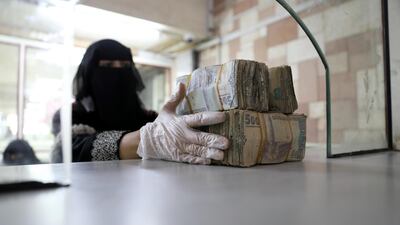From Yemen all the way to Lebanon and Syria, failed economic policies are costing people their hard-earned money and many are starting to see their savings shrink by the day.
In Sanaa, banknotes have become an unexpected battleground where the Iran-backed Houthi rebels try to impose their illegal rule and play out their differences against the government - at the expense of ordinary Yemenis.
When Yemen’s capital was seized by the Houthis in 2014, the central bank was split in two: a Houthi-controlled branch in Sanaa, and another in government-controlled Aden, which has access to printers. In the areas under their control, the Houthis have outlawed the use of new banknotes, which are printed by the central bank in Aden.
The Houthi ban is supposed to control inflation but in reality, it has created two competing currencies in one country and left Yemenis caught in the crossfire. In the past month, people living in Houthis areas have had to queue for hours to exchange new banknotes for worn-out bills, at extortionate rates. Those living in the south have found themselves flooded with new banknotes that they can no longer use for basic necessities such as food and medicine. Yemen needs one, united central bank that is neutral and non-affiliated. Its purpose should be to serve the nation’s economy, not to become a weapon of war. Endless queues have become a common sight at Yemen’s currency exchange offices, but also at Lebanese banks.
For the past thirty years, Beirut has been run by an incompetent elite that has depleted its public funds and turned Lebanon into the world’s third most heavily indebted country. In the past months, former prime minister Saad Hariri failed to secure another aid package from traditional donors to save the economy and the US imposed tougher sanctions to limit the reach of Hezbollah. A shortage of American dollars, to which the Lebanese pound is pegged, ensued in November. As a result, the Lebanese pound has lost half of its value on the black market. The situation has snowballed into Lebanon’s most severe economic and financial crisis in three decades.
Banks have started to impose informal capital controls, limiting the amount of foreign currency withdrawal to a couple hundred dollars per week, and forbidding people from transferring money abroad.
Millions of people with school tuition to pay, loans to reimburse and families to feed now have only limited access to their own money. Many have also seen the value of their salaries halve, and their living conditions deteriorate.
In the meantime, the Lebanese have risen up against their government demanding competent, committed and non-sectarian leadership. In the past week, protesters have gone as far as to attack and burn the very banks where they keep their money, in a desperate attempt to get politicians - who have been wrangling over the formation of a new government for three months - to finally act. And the collapse of Lebanon’s banking sector has affected not one but two countries.
On the other side of the border, the Syrian pound, which fared at 50 to the dollar in 2011 plummeted to 487 to the dollar after the war. Since the onset of Lebanon's financial crisis its has lost more than half of its value on the black market, reaching 1,200 pounds to the dollar. Syria has been under economic sanctions for years, and Lebanon's banking sector was its only means to access the global economy. Syrians have faced more than their fair share of hardships in the past nine years. Yet instead of working on improving the lives of his people, Syria’s president Bashar Al Assad issued a decree increasing the penalty for those dealing in foreign currencies to seven years of hard labour.
Decades of war, corruption and financial mismanagement have weighed on the economies of Syria, Lebanon and Yemen. The origin of the problem may differ for each country, but the end result is always the same.
Vulnerable citizens must not be made to pay the price of their leaders’ failed economic policies while a select few benefit from the status quo.

